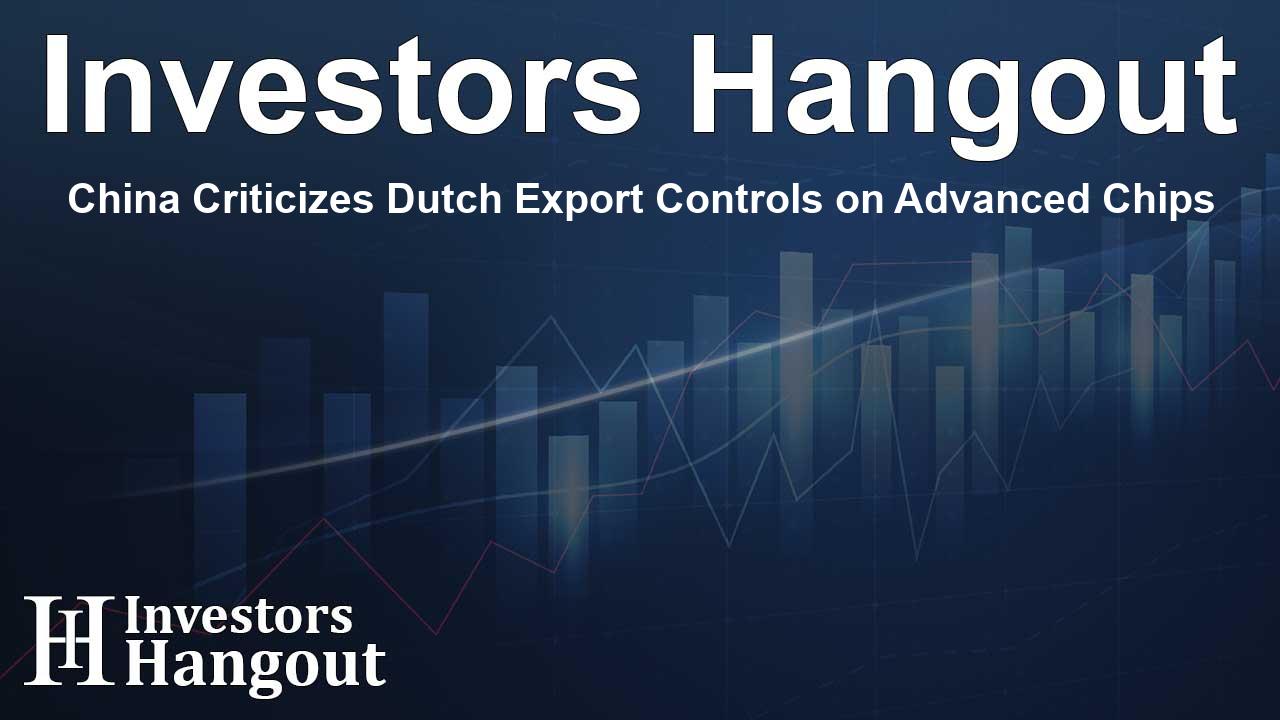China Criticizes Dutch Export Controls on Advanced Chips

China's Reaction to Dutch Export Controls on Chips
China recently voiced its dissatisfaction regarding the Dutch government's decision to impose expanded export controls on ASML's chipmaking equipment. This move has drawn criticism from Beijing, particularly as it aligns closely with similar restrictions initiated by the United States.
Details of the Export Control Expansion
The Dutch government announced that it would extend export licensing requirements specifically for ASML's 1970i and 1980i DUV lithography tools. These tools are pivotal in semiconductor manufacturing, and the measures are designed to enhance compliance with U.S. policy on export restrictions.
Beijing's Critique of U.S. Influence
China has consistently condemned the United States for exerting pressure on its allies, such as the Netherlands and Japan, to adopt export controls that limit access to cutting-edge chip technology. The Chinese commerce ministry emphasized that in recent years, the U.S. has been attempting to enforce its dominance and has compelled certain nations to tighten their export controls on semiconductors.
Call for Cooperation
In its statement, China's commerce ministry urged the Dutch government to refrain from misusing export controls and to consider the potential impact on bilateral cooperation in the semiconductor sector. The ministry underscored the importance of fostering mutual benefits for enterprises in both countries.
Impact on ASML
ASML stands as the world's leading supplier of chipmaking equipment, and its advanced lithography systems are crucial for the global semiconductor market. The U.S. lobbying efforts have significantly curtailed ASML's ability to export its most sophisticated systems to China, which has raised concerns about the future of technological exchange between the two nations.
Dutch Government's Stance
Dutch Trade Minister Reinette Klever articulated that the decision to tighten export controls was made with national security in mind. This statement reflects the broader geopolitical tensions surrounding semiconductor technology and trade.
Frequently Asked Questions
What prompted China's criticism of Dutch export controls?
China criticized the Dutch government's export controls due to their alignment with U.S. restrictions, which further limit Chinese access to advanced chipmaking technology.
What specific equipment is affected by the export controls?
The controls focus on ASML's 1970i and 1980i DUV lithography tools, which are essential in the semiconductor manufacturing process.
How has the U.S. influenced the Dutch decision?
The U.S. has been active in persuading its allies, including the Netherlands, to adopt stricter export controls to maintain its technological dominance over China.
What are the potential consequences for ASML?
ASML, being the largest vendor of chipmaking equipment, faces significant restrictions on exporting its advanced technologies to China, impacting its market position.
What does China hope for in its relationship with the Netherlands?
China seeks to maintain cooperation with the Netherlands in the semiconductor field and encourages a balanced approach to export controls that benefits both nations.
About The Author
Contact Lucas Young privately here. Or send an email with ATTN: Lucas Young as the subject to contact@investorshangout.com.
About Investors Hangout
Investors Hangout is a leading online stock forum for financial discussion and learning, offering a wide range of free tools and resources. It draws in traders of all levels, who exchange market knowledge, investigate trading tactics, and keep an eye on industry developments in real time. Featuring financial articles, stock message boards, quotes, charts, company profiles, and live news updates. Through cooperative learning and a wealth of informational resources, it helps users from novices creating their first portfolios to experts honing their techniques. Join Investors Hangout today: https://investorshangout.com/
The content of this article is based on factual, publicly available information and does not represent legal, financial, or investment advice. Investors Hangout does not offer financial advice, and the author is not a licensed financial advisor. Consult a qualified advisor before making any financial or investment decisions based on this article. This article should not be considered advice to purchase, sell, or hold any securities or other investments. If any of the material provided here is inaccurate, please contact us for corrections.
